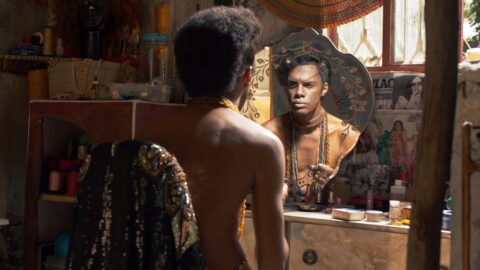Familial strife and political friction binds three generations of Brazilian women in Malu (2024). Writer-director Pedro Freire, who modelled his eponymous matriarch after his actress mother, evidently harbours a close attachment to the material while injecting Malu’s capricious outbursts with the brio befitting her profession.
It’s the 1990s. Malu (Yara de Novaes) is out of work and living at home with her mother Lili (Juliana Carneiro da Cunha) in a Rio favela. Malu’s rancour is momentarily quelled by the arrival of her estranged daughter (Carol Duarte), a television actress visiting from São Paulo. Yet Malu’s militant philosophy of political theatre, coupled with barely-suppressed rage towards Juliana’s father, threatens to alienate her only child and living parent.
As a Cassavetes-inflected portrait of actors, Malu’s interest lies primarily in how the personalities of certain performers can be conducive or detrimental to their interpersonal relationships. Malu herself possesses the greatest depth in understanding how her conception of art was informed by the tumultuous years of the Brazilian military dictatorship. The societal tumult of that era enabled a calcified narrative that she recites to avoid taking responsibility for her personal failures.
Freire intelligently lets his actors inhabit their characters in sequences of claustrophobic intensity. Abetted by a 1.33:1 aspect ratio, these confrontations foreground the confessional potency of theatrical performance. The film’s political overtures to this element manifest in Tibira (Átila Bee), a drag queen and Malu’s closest friend. Yet their abrupt disappearance from the film, while narratively logical, problematises their primary role in the film as a political mouthpiece.
Malu does bear an inherent ambivalence towards the Brazilian government’s treatment of the marginalised. Its strongest through-line is belying the romanticisation of impoverished artists, and its closing stretches are utterly devoid of such misguided impulses. If Freire’s thematic reach exceeds his grasp, his humanist debut nevertheless bears some insight into how political history compounds intergenerational trauma.
Nick Kouhi is a programmer and critic based in Minneapolis, Minnesota





